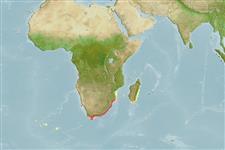Environment: milieu / climate zone / depth range / distribution range
Ekologi
laut; air tawar; payau; kisaran kedalaman 0 - ? m. Subtropical
Western Indian Ocean: coastal waters and estuaries of South Africa, from Cape of Good Hope east and north to False Bay, Natal and St. Lucia coast of North Zululand (Ref. 6798); and to Lake Piti in southern Mozambique (Ref. 4164).
Length at first maturity / Size / Weight / umur
Maturity: Lm 8.0 range ? - ? cm
Max length : 16.0 cm TL jantan/; (Ref. 4164)
deskripsi pendek
Morfologi | Morfometrik
Duri punggung (Keseluruhan (total)): 0; duri punggung lunak (Keseluruhan (total)): 14-17; Duri dubur 0; Sirip dubur lunak: 15 - 16.
Found in coastal waters and estuaries (Ref. 4164, 5213), also enters freshwater (Ref. 6798).
Life cycle and mating behavior
Kematangan | Reproduksi, perkembang biakan | Pemijahan | telur-telur | Fecundity | Larva
Collette, B.B., 1986. Hemiramphidae. p. 163-164. In J. Daget, J.P. Gosse and D.F.E. Thys van den Audenaerde (eds.) Check-list of the freshwater fishes of Africa (CLOFFA). ISNB, Brussels; MRAC, Tervuren; and ORSTOM, Paris. Vol. 2. (Ref. 6798)
Status IUCN Red List (Ref. 130435)
ancaman kepada manusia
Harmless
penggunaan manusia
informasi lanjut
Umur / SaizPertumbuhanpanjang-beratpanjang-panjangukuran frekuensiMorfometrikMorfologiLarvaDinamika larvapemulihanKelimpahanBRUVS
AcuanBudidaya airprofil budidaya airStrainGenetikaElectrophoresesDiturunkanPenyakit-penyakitPengolahanNutrientsMass conversion
mitraGambarStamps, Coins Misc.Suara-suaraCiguateraKecepatanTipe renangArea insangOtolithsOtakPenglihatan / visi
Alat, peralatan
laporan khas
muat turun XML
Sumber internet
Estimates based on models
Preferred temperature (Ref.
123201): 18.9 - 26.3, mean 24.9 °C (based on 28 cells).
Phylogenetic diversity index (Ref.
82804): PD
50 = 0.5000 [Uniqueness, from 0.5 = low to 2.0 = high].
Bayesian length-weight: a=0.00257 (0.00115 - 0.00574), b=3.09 (2.91 - 3.27), in cm total length, based on LWR estimates for this Genus-body shape (Ref.
93245).
Trophic level (Ref.
69278): 2.1 ±0.1 se; based on diet studies.
Daya lenting (Ref.
120179): Tinggi, Waktu penggandaan populasi minimum kurang dari 15 bulan (Preliminary K or Fecundity.).
Fishing Vulnerability (Ref.
59153): Low vulnerability (10 of 100).
